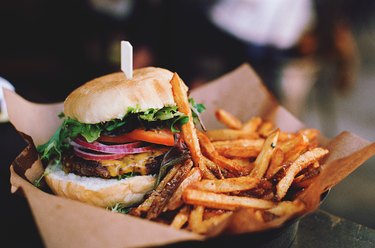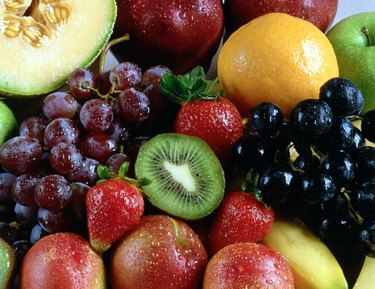No, the hot sauce you put on your eggs and chili did not cause your ulcer. But adding it to your food may not make you feel better. Gastric ulcers are caused by bacteria known as Helicobacter pylori. Diet may not be responsible for the painful stomach sores. But sticking to a healthy, well-balanced diet and staying away from foods that make your ulcer hurt may help stop flare-ups and pain. If a food makes your ulcer worse, you should not eat it on your ulcer diet, even if the food is thought to not bother ulcers.
Even if your diet doesn’t cause your gastric ulcer, eating foods that are good for them will help you heal and stop more flare-ups.
Nutrient-rich fruits and vegetables make good snacks for ulcer patients when trying to limit ulcer pain. During the week, eat a variety of foods that are good for ulcers. For extra nutrients, eat lots of green and orange vegetables like broccoli, spinach, carrots, and sweet potatoes. Flavonoids, which can be found in apples, cranberries, cranberry juice, onions, and celery, may help stop the growth of H pylori bacteria.
In February 2019, the Journal of Clinical Medicine published a study that found some flavonoids alone may be used as an alternative or extra treatment for an H pylori infection. Additionally, the fiber in fruits and vegetables may help speed up ulcer healing.
Ulcers can be a painful and disruptive condition. They occur when the lining of the stomach, small intestine or esophagus is eroded away, forming open, irritated sores. While spicy foods tend to get the most attention when it comes to ulcer diets, many people wonder whether classics like pork are okay to eat or likely to trigger symptoms.
This article takes a closer look at the various types of pork and how they may impact ulcers based on fat content, preparation method and other factors.
How Do Diets Impact Ulcers?
Certain foods tend to aggravate ulcers more than others. Common triggers include:
- Spicy foods – Chili peppers, hot sauce, black pepper.
- Acidic foods – Citrus fruits, tomato products, vinegar.
- Fatty foods – Fried items, fatty meats, whole milk dairy.
- Alcohol and caffeine – Can directly irritate the stomach lining.
On the flip side, bland low-fat foods tend to be gentlest on ulcers. Low fiber foods may also help during flare-ups since fiber can be rough on sensitive stomach or intestinal tissues.
So what does this mean for pork, which varies widely in fat content and texture based on the cut?
Lean Pork Cuts
Leaner pork cuts like pork loin or tenderloin are reasonable options if you have ulcers. A 3-ounce serving contains just 2-3 grams of fat, comparable to skinless chicken breast.
Go easy on marinades and spice rubs to prevent irritation. Opt for gentle cooking methods like baking, grilling or sautéing instead of frying. Pair pork with soft, low-fiber cooked vegetables vs raw produce.
Fattier Pork Cuts
Rib and shoulder cuts of pork tend to be higher in fat. A 3-ounce serving can contain 5-8 grams of saturated fat.
While delicious, fatty pork may be more likely to cause discomfort. The saturated fat can stimulate stomach acid production. Fried preparation also creates crispy bits that may scratch and irritate the tender stomach lining
Save these indulgences for special occasions when you’re feeling well. Opt for leaner meats and tender cooking methods when ulcers are active.
Processed Pork Products
Bacon, sausage, ham and lunch meats are very high in saturated fat and salt, both of which can aggravate ulcers.
Nitrates and nitrites used to preserve these products may also cause issues for those sensitive to these compounds. And if smoked, they contain compounds that may promote inflammation.
It’s best to avoid highly processed pork when ulcers are flaring up. Substitute with homemade bean or lentil soups and stews for plant-based protein instead.
Soups and Stews
When you’re not up for chewing, pork soups and stews can provide comfort and protein.
Choose lean pork and go easy on spices and salt. Cook vegetables thoroughly until very soft. Pureed soups can further reduce irritation.
This allows you to enjoy pork’s flavor and protein without taxing your stomach too much.
Grilled and Smoked Pork
The charred, blackened areas of grilled pork contain compounds called polycyclic aromatic hydrocarbons (PAHs). These may promote inflammation and stomach irritation, especially in those with ulcers.
Smoking pork produces similar compounds alongside formaldehyde and other substances that may be ulcer-aggravating as well.
Go easy on charred and smoked pork varieties when ulcers are active. Allowing marinades and rubs to penetrate 15 minutes vs hours can also help reduce charring.
The Bottom Line
Leaner, minimally processed pork cuts like tenderloin are usually fine for those with ulcers when prepared gently without heavy spices and pairings.
Fattier cuts, processed pork and heavily charred/smoked varieties are best minimized or avoided during ulcer flares when the stomach lining is highly sensitive.
Focus on soothing recipes like lean pork stews, boiled pork and pork mixed into congee or juk when ulcers are bothering you. And always allow your stomach to guide you – avoid any foods that seem to make symptoms worse.
With the right dietary precautions and medications, most ulcers can heal within 4-8 weeks. Paying attention to your individual trigger foods can help speed recovery and prevent future flares.
:max_bytes(150000):strip_icc()/what-can-i-eat-if-i-have-a-peptic-ulcer-1742154-01-c1eef95d401642d39f79e845bc929603.png)
Go With Whole Grains
Grains, such as bread, rice and pasta, may also be well-tolerated by those dealing with a gastric ulcer. Make at least half your grain choices whole grain to increase your fiber intake and help with the healing. In addition to fiber, whole grains are also a good source of essential micronutrients you need for overall good health such as B vitamins, magnesium, iron and selenium. Examples of whole grains include whole-wheat bread, brown rice, oatmeal and millet.
Keep Your Dairy Low Fat
Foods high in fat may cause discomfort and should be avoided when you have an ulcer, so include dairy foods that are low in fat. Good choices include low-fat or nonfat milk, yogurt or cheese, buttermilk, low-fat ice cream or sherbet. If you do not tolerate dairy foods, soy milk may be an option for you. Milk does not coat the stomach to relieve pain, so it is not necessary to drink large amounts, according to MedlinePlus.



Top 10 Foods to Heal Your Stomach Ulcer Naturally
FAQ
What meat is good for ulcers?
Can you eat bacon with an ulcer?
Can you have pork with gastritis?
What foods soothe an ulcer?
